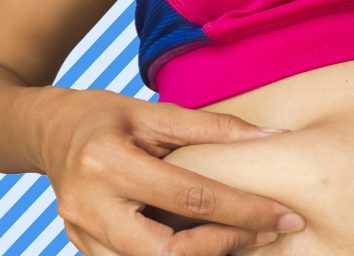15 Easy Ways to Reset Your Diet
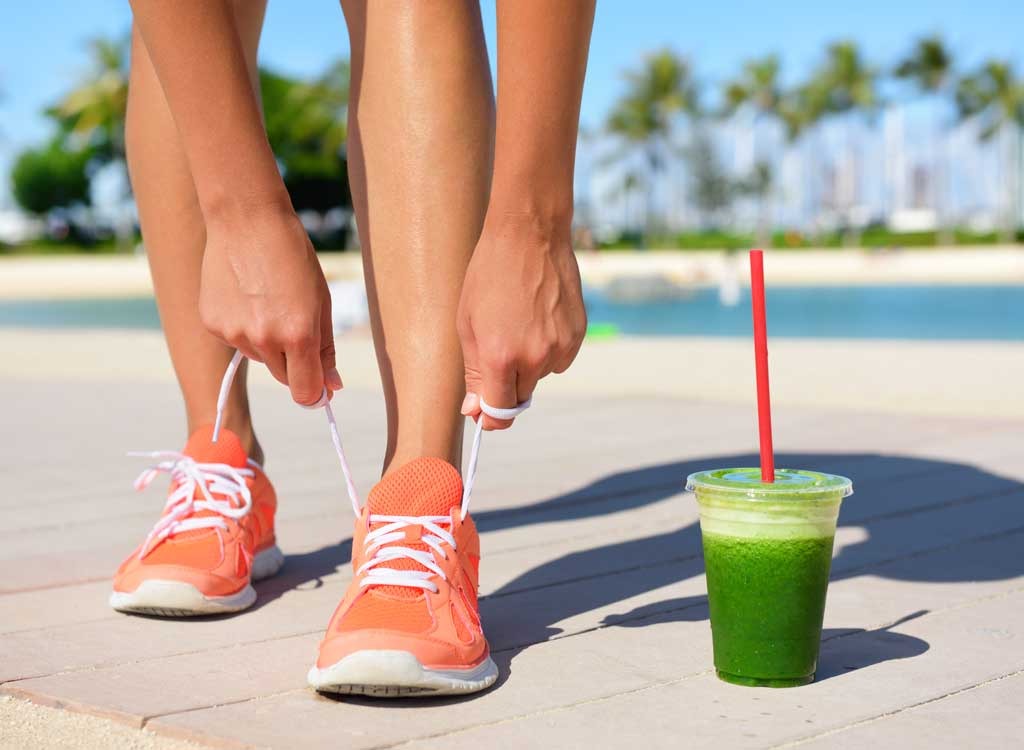
Whatever your R&R of choice—whether it was a week in the tropics or a holiday weekend at the shore—when you think of a vacation, there are many things you do want: to catch up on sleep, read a new book, spend time with your friends and family, and enjoy the outdoors. A bloated belly is not one of the things on your wishlist.
We totally get that time off from work might feel like time to treat yourself (you’ve earned it, right?), but that doesn’t mean you have a free pass to go overboard. Unfortunately, the deadly duo of your toes in the sand and a cold one in your hand is the kill-switch that causes many of us to throw our diets by the wayside. It may not wreck our health, but a long weekend spent indulging in booze and guilty pleasures day-in and day-out can spell bad news for your belly—leaving you looking a bit less chiseled than you did before you left the house.
In fact, according to a study done by the University of Georgia’s College of Family and Consumer Sciences, Americans gain an average of one pound during their one to three week-long vacations—and that weight sticks around even after six weeks of being home. A mere pound may not seem like much, but keep in mind one to two pounds are typically gained over an entire year! Don’t feel too guilty, though; the good news is there are easy ways to ditch the fresh flab and revitalize your neglected diet. So what can you do to bounce back to your better-body self? Scroll through to find out. And before you plan your next escape, minimize your chances of gaining unnecessary weight by reading up on these 30 Worst Vacation Habits For Your Waistline.
Get Back To Your Routine
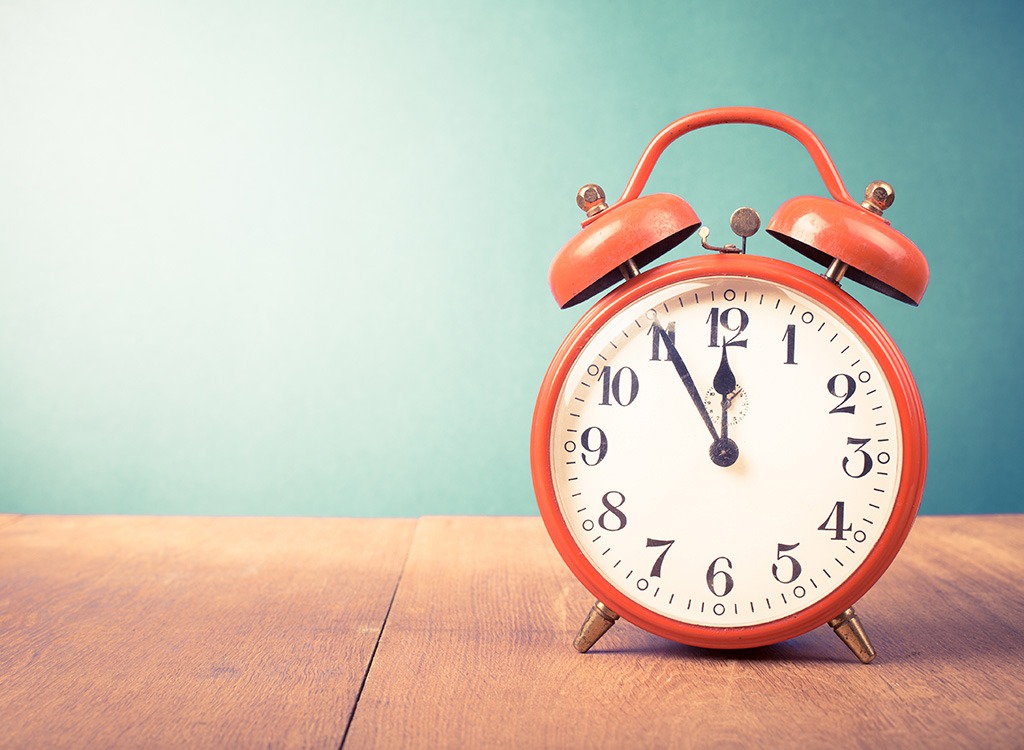
Take a shower when you get home. Unpack your bags. Set your A.M. alarm. Have a cup of tea before bed. Set yourself up to be able to do whatever it is you normally do every day. This way, you’ll be able to shift yourself—and your body—back into fit mode.
You may be wiped, but unpacking your bags on day one will ensure you have clean clothes for the week ahead, will clear your mind and the stress you may have later in the week about the extra load you’ll have to do (on top of the work your boss just sprung on you), and it’s a good way to remind yourself you’re no longer on vacation. Once that’s done, make a point to get to bed at the same time you normally would before work—even if you get home from being away a day early. Studies have found that those who keep the same sleep-wake cycles are more rested and less apt to have their diets undermined by exhaustion-induced munchies.
Go Grocery Shopping
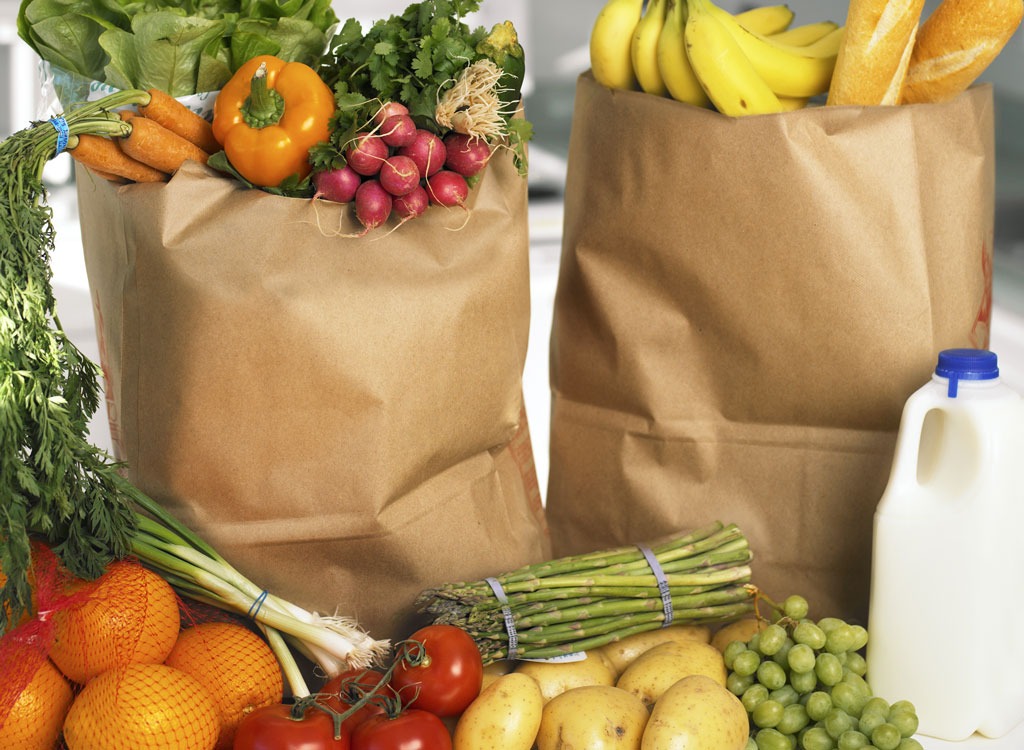
If you’ve been away for more than a couple days, you likely don’t have much left in your fridge upon getting home. Rather than the easy solution of just picking up the phone to order take-out, muster up the willpower to go grocery shopping. (Yes, even if you still have these 35 Healthy Foods Busy People Keep Stocked in your kitchen—you’re in need of some fresh foods.) Having fresh, healthy items in your fridge for the first few days home will ensure you stick to your diet—rather than continue on the indulgent path you led while away.
Your first meal back doesn’t have to be anything crazy—just stick to your favorite go-to busy weeknight meal. If you don’t have one, don’t fret. We’re fans of herb-and-lemon marinated chicken breasts with a side of roasted veggies. The best part? Every ingredient can be thrown on a sheet pan and baked for a quick meal and even quicker cleanup.
Prioritize Produce
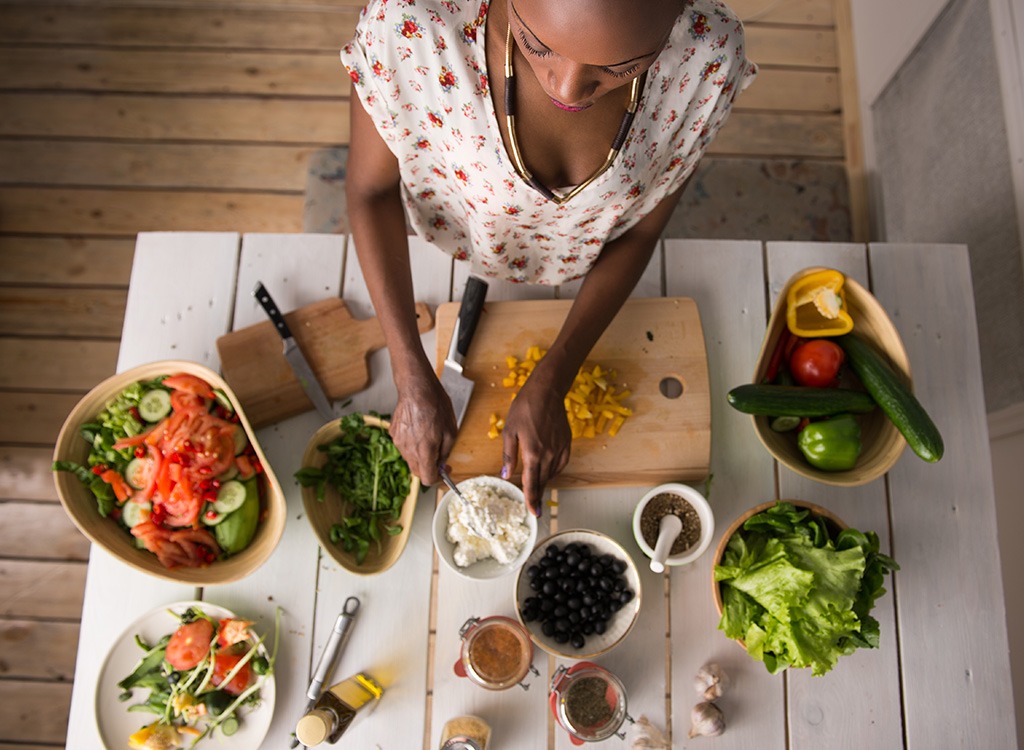
Your days of beers and buffets are long gone. Ensuring healthy items are the most convenient foods in your fridge when you get home will make it even easier to get back on track by encouraging you to make healthy choices. This trick isn’t just good for resetting your diet, it’s also one of 15 Ways to Break your Bad Eating Habits.
Keep pre-cut veggies with hummus in the front of your fridge, put a bowl of fresh fruit on your counter, and hide treats like cookies, candy, and chips on a high shelf and behind healthy foods so they are out of sight and out of mind.
Don’t Reach for the Remote

When you get home after a long trip, it’s natural to want to relax (even though we hope you got enough of that on your vacay!). But just because you’re tired from traveling doesn’t mean your first instinct should be to click on the TV and get settled for a long binge-watch—especially if you’re feeling hungry. A University of Houston study found that the more TV people watched in a setting, the worse their food choices became. So even though you think it might be the best way to decompress after a busy weekend, a couple hours of your favorite show could set you back even more calories on top of an already indulgent weekend.
If you’re definitely going to watch a show when you get home, keep it to a 30-minute limit. Looking for other ways to stay busy? Go back to tip #1 and do things that will help your body get back on track! Unpack your things, go grocery shopping, reorganize your kitchen. Or if you just want to relax, read a book, play a board game with your family, or listen to music.
Nix Added Sugar

Downing pina coladas and crème brule on vacation only adds fuel to the weight-inducing inflammation fire. That’s because table sugar—which is made up of equal parts glucose and fructose—boosts inflammation in two ways. Glucose, when eaten in excess (even during a single sitting of daiquiris on the dock), can increase levels of pro-inflammatory messengers called cytokines. Concurrently, fructose is the sugar molecule which most easily creates advanced glycation end-products (AGEs) in the blood. AGEs occur when fructose causes proteins to haphazardly glom together, creating cellular junk that your body tries to dispose of by increasing defensive receptors and more inflammation markers. While it may be challenging, nixing the sweet stuff when you’re back at home is a great way to shed those unwelcomed belly jiggles.
Eliminating added sugars and foods made with white flour can help you get back on the weight-loss bandwagon because it’ll stop stoking your inflammation fire and encourage you to eat healthier foods—many of which actually decrease inflammation. A simple swap is subbing out high-glycemic foods (which spike and crash blood sugar) for low GI alternatives, like whole grains and foods with healthy fats, protein, and fibers. A study in the Journal of Nutrition actually found that a low-GI diet reduced levels of the inflammatory biomarker C-reactive protein.
Make Sure to Hydrate
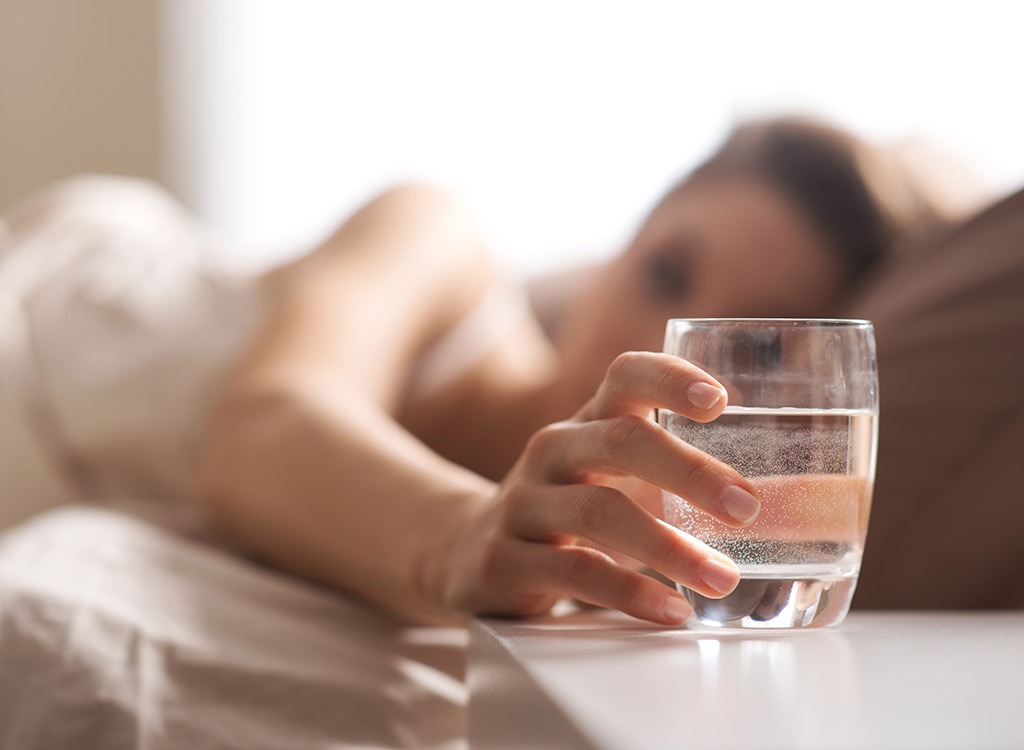
Boozing on vacay and flying home from the trip both cause dehydration, which can increase hunger and cause poor circulation. In turn, you’ll likely feel bloated and really sleepy. And that’s not all—there are also 12 other things that happen to your body when you don’t drink enough water. Add a calendar reminder or set an alarm every few hours to remind yourself to hydrate! Aim to consume half of your body weight in ounces throughout the course of the day. You’ll likely feel rehydrated after a few days of this regimen.
The easiest way to hydrate is by drinking a cup of water upon waking. New research from the Journal of Human Nutrition and Dietetics showed that people who increased their water by a mere cup a day ate up to 205 fewer calories and 200 fewer milligrams of sodium daily. So not only will sipping on an extra 8 ounces in the A.M. help you minimize overeating to shed that extra vacay pound, it will also boost your energy and help your body flush out salt and leftovers that are lingering in your colon.
Resume —and Amp Up— Your Exercise Routine
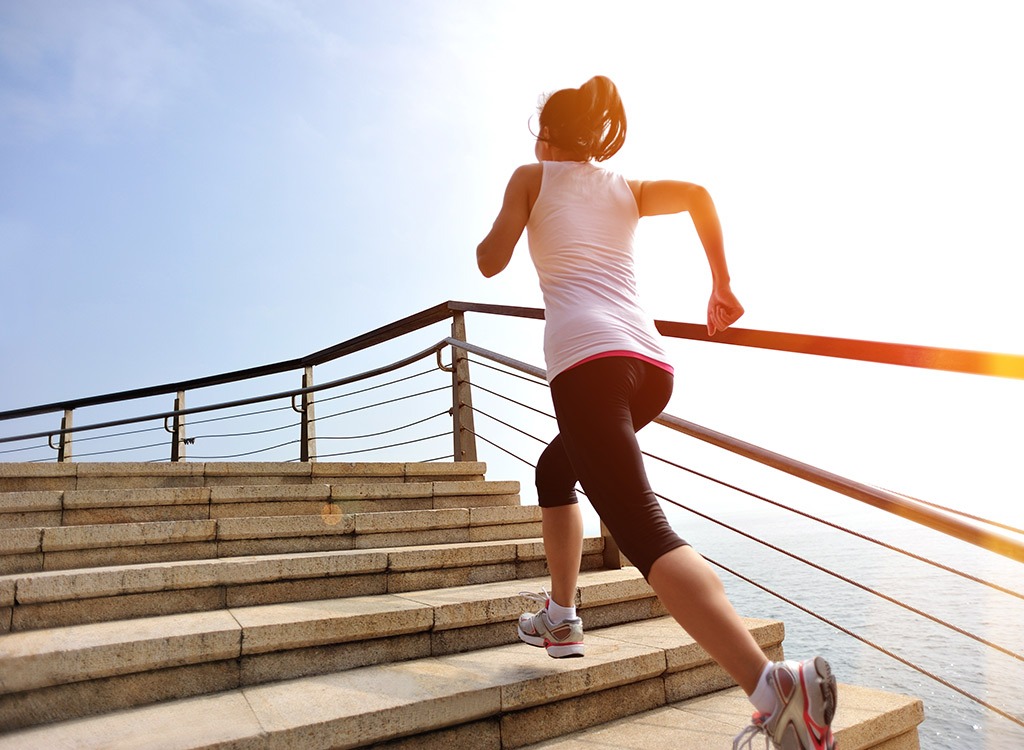
Getting back into your exercise routine will be a huge help in shedding those pesky post-vacation pounds. Many of us “forget” to pack our sneakers and gym clothes when we go on vacation, leaving us few options when it comes to maintaining our fitness routine. According to experts, taking a week off won’t cause you to lose all your strength and endurance, but this break will cut down 50 percent of the improvements you made in the weeks prior—making it feel like you’ve reached a weight-loss plateau. To counter it, be sure to head back to the gym, and begin with higher intensity workouts than you may have been doing to activate new muscles and ramp up the calorie burn.
“The most effective workouts are high intensity and combine a bit of cardio and weight training,” explains Kaufman. Check out classes like cardio-boxing or boot camps, which are typically held at local gyms but can also be found in online videos. Just remember, while no amount of fitness will undo a bad diet on its own, when you get back into a weekly exercise routine and make a point of incorporating in some extra-intense drills, you’ll be fueling your diet-centric weight-loss efforts. Cycling in new, high-intensity exercises often in your exercise routine is also a critical step in ensuring you don’t regain lost weight.
Catch Up On Sleep
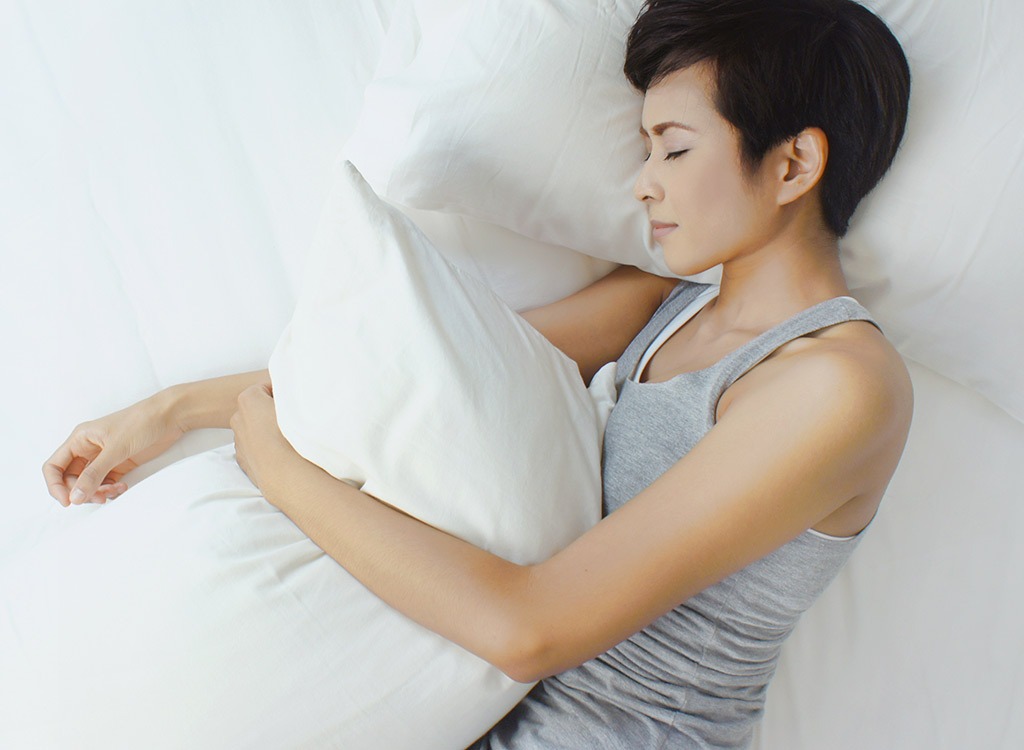
Whether it’s because you never seem to sleep well unless you’re in your own bed or because you’re totally wiped from all the sun you’ve gotten over the past few days, you may return home from your trip feeling both exhausted and a little softer around the middle. Why? When we’re sleepy, the production of leptin (the hormone that tells us we’re full) decreases, which can lead to overeating and weight gain. Not cool. To help the weight back come off, be sure to fit in between six and eight hours of sleep per night once you’re back home.
If you’ve got your goals set on getting back to your more slender self, cut your nightly Netflix session short an hour before bed—it’ll minimize your exposure to melatonin-disrupting blue light and remove stimulation which keeps your brain awake. Master your bedtime routine with our exclusive guide to 30 Things to Do 30 Minutes Before Bed to Lose Weight.
Boost Your Immune System
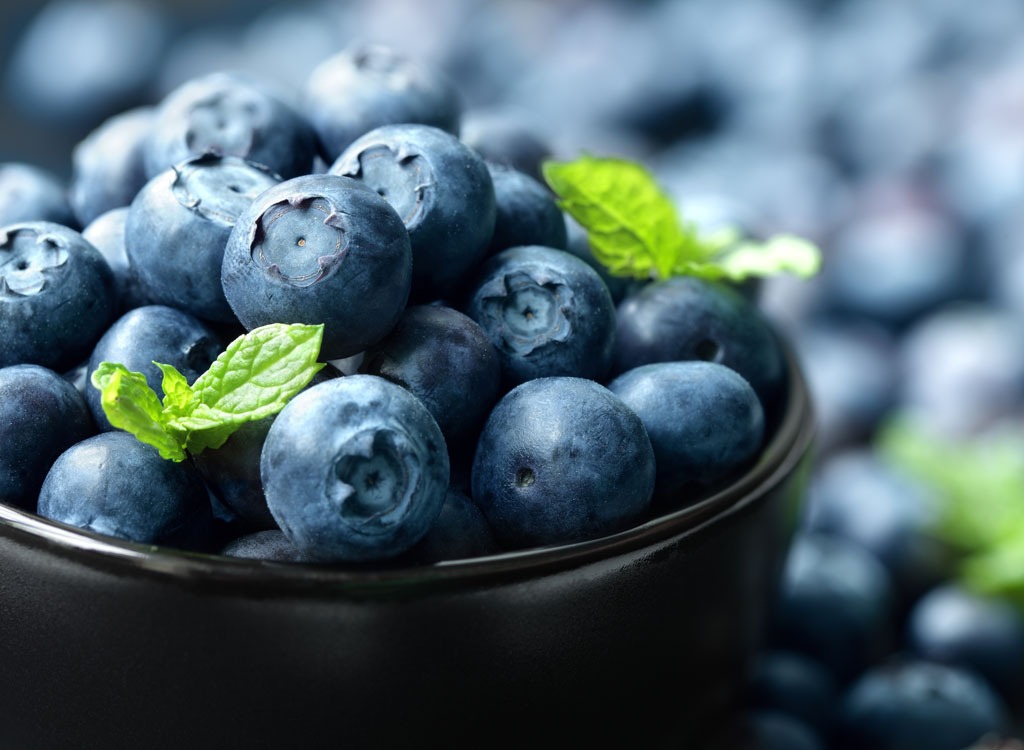
Travel is immensely taxing on your body—even just the sitting in a car for hours part. That’s because coordinating schedules, packing, leaving home, all cause stress along with the need to constantly be alert. All that on top of lounging in the sun all day, working up a sweat hiking around town, and a lack of sleep causes your body’s energy stores to become depleted and your immune system is put in jeopardy. To compensate for a lack of cold-fighting-power, try to emphasize fruits, veggies, and meat-replacing legumes at each meal to boost your immune system, while staying away from calorie-dense items, ultra-processed foods, and animal products. This will help you maximize fiber intake and detoxification.
Medicating with vitamins from whole foods is much better than meds when it comes to rebooting a compromised immune system. And blueberries are one of your best options: researchers from Oregon State University recently took a look at over 400 compounds for their ability to boost the immune system. The standout? A compound called pterostilbene, which is found in abundance in the little blue fruits.
Mend Your Gut
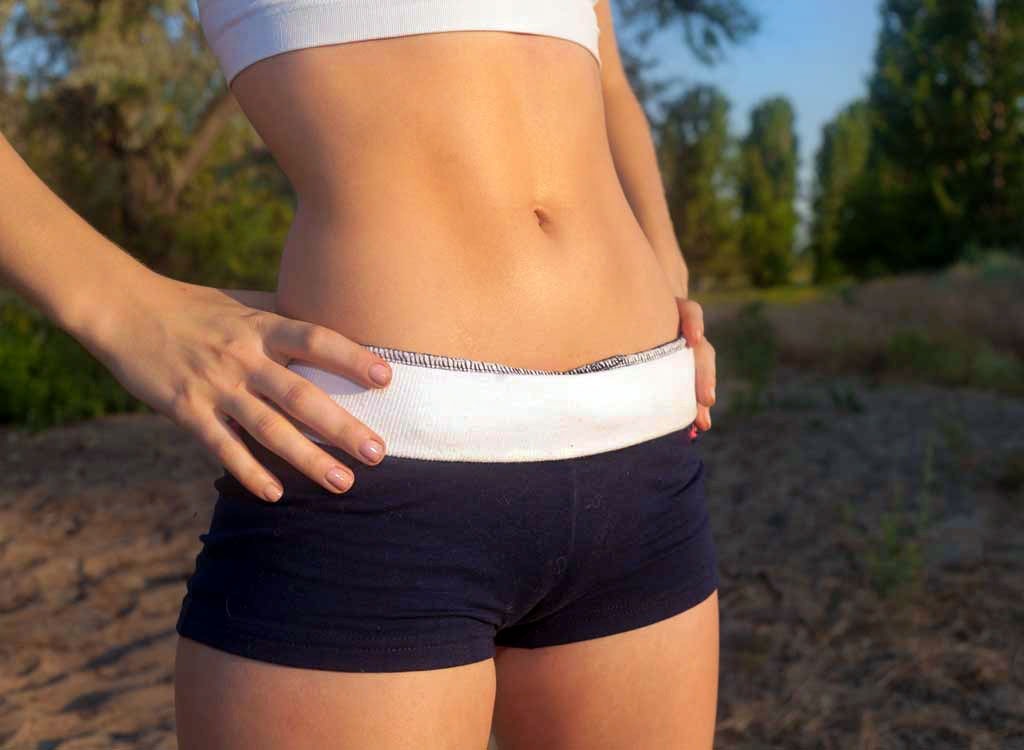
Lack of sleep, exercise, and healthy foods, as well as consuming too much fat- and sugar-laden treats and alcohol on vacation is a recipe for a damaged gut. That’s because each of these activities has been found to throw your gut microbiome off kilter. Specifically, all the sugar you may have been eating is fuel for pathogenic bacteria, fungi, and yeast—all bad microbes which can conquer and diminish levels of your beneficial bacteria. When that happens, you’re at risk for higher levels of inflammation, poor digestion, and unnecessary weight gain.
You likely haven’t done much lasting damage over such a short amount of time, but boosting your belly biome after a little break from your diet will help you get back on track, as maintaining a healthy gut will also help you sleep better, regulate your hunger hormones, and boost immunity—all crucial benefits post-fun-in-the-sun. Look for prebiotics, like legumes, onions, artichokes, spinach, and oats, to feed the good guys in your gut to help them build strength, as well as probiotics, which function as reinforcements, helping to drive out the bad guys. For the best backup, check out these 18 Probiotic Foods for a Healthy Gut.
Ditch The Booze
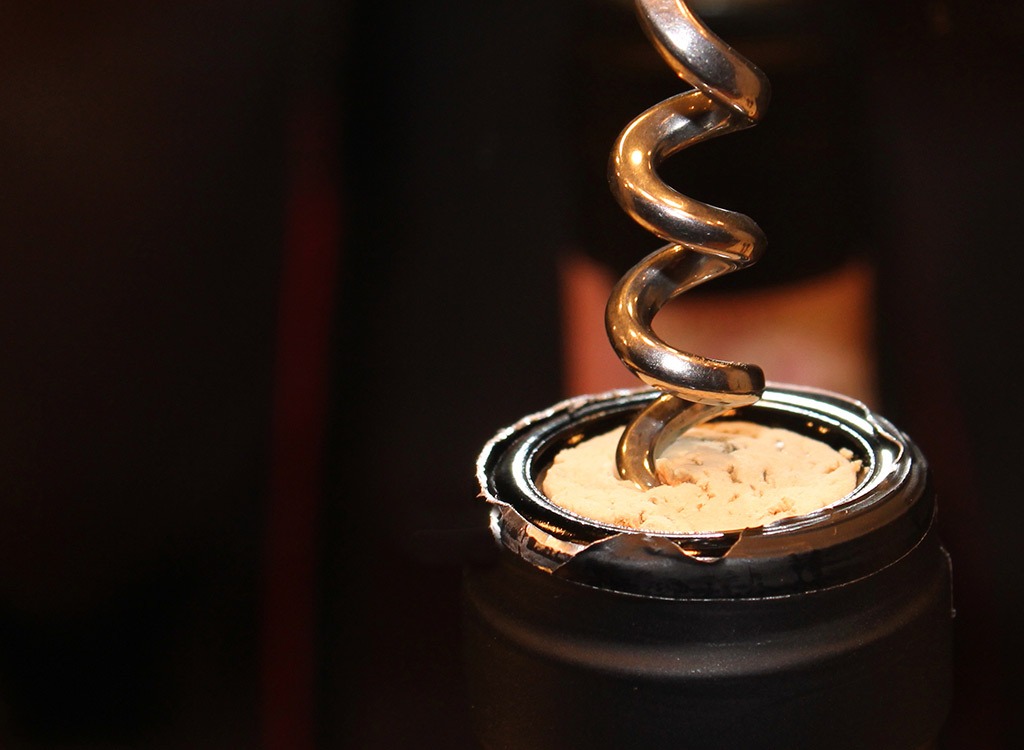
For some, taking a break from boozing may actually be welcomed advice following the few-too-many drinks you had while you were away. Alcohol, which packs seven calories per gram, can provide an excess of at least 100 calories in your daily intake. “Cutting out these calories will naturally accelerate your post-vacation weight loss,” explains Leah Kaufman, MS, RD, CDN, “Plus, drinking dehydrates you and can decrease your inhibitions, which may lead to eating foods that aren’t so diet-friendly (think, pizza, burgers, and fries) and derail your efforts.” In fact, this is the cause behind why drinking alcohol often is one of the 20 Reasons Why You’re Always Hungry. No matter how you look at it, saying sayonara to the bottle for a few weeks is a win-win.
Besides curbing your hunger pangs, there are many benefits to giving up alcohol, including losing weight and sleeping better. Instead of grabbing a glass during happy hours, opt for a cup of green tea, or sparkling cranberry juice—both are full of anti-inflammatory antioxidants to help quell inflammation and keep your system hydrated.
Munch On Magnesium
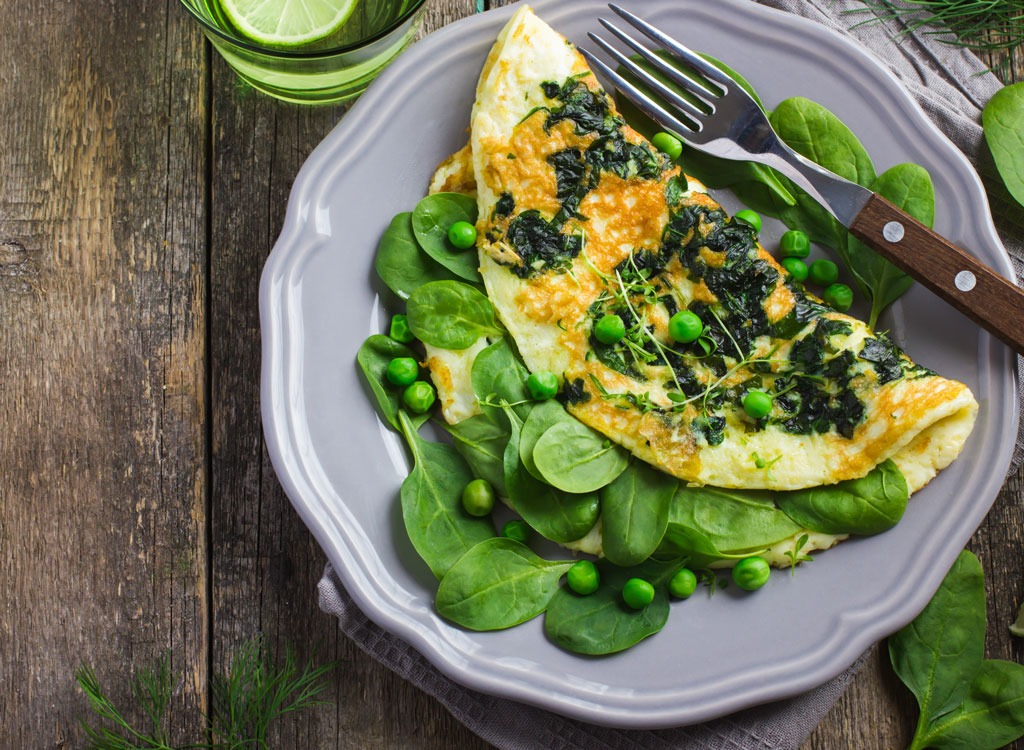
Your free-spirited high of vacation may come crashing down—hard—when you realize what work has piled up since you’ve been gone. But when your body is still trying to reset from a break in your dutiful diet, the excess stress can fizzle out any attempt to reboot your system. To keep your stress hormone, known as cortisol, levels down, pop 250 milligrams of magnesium daily. This mineral aids in relaxation and has also been shown to boost lipolysis, a process by which the body releases fat from its stores. Find out more about the benefits of magnesium.
Eat This! Tip
You don’t have to pop a magnesium supplement to reach your daily dose. Just adding a single cup of cooked spinach to your morning omelet will provide you with over 150 milligrams of magnesium—or get the same amount from an ounce of pumpkin seeds sprinkled on top of your morning oatmeal or yogurt.
Take a Break from the Buzz
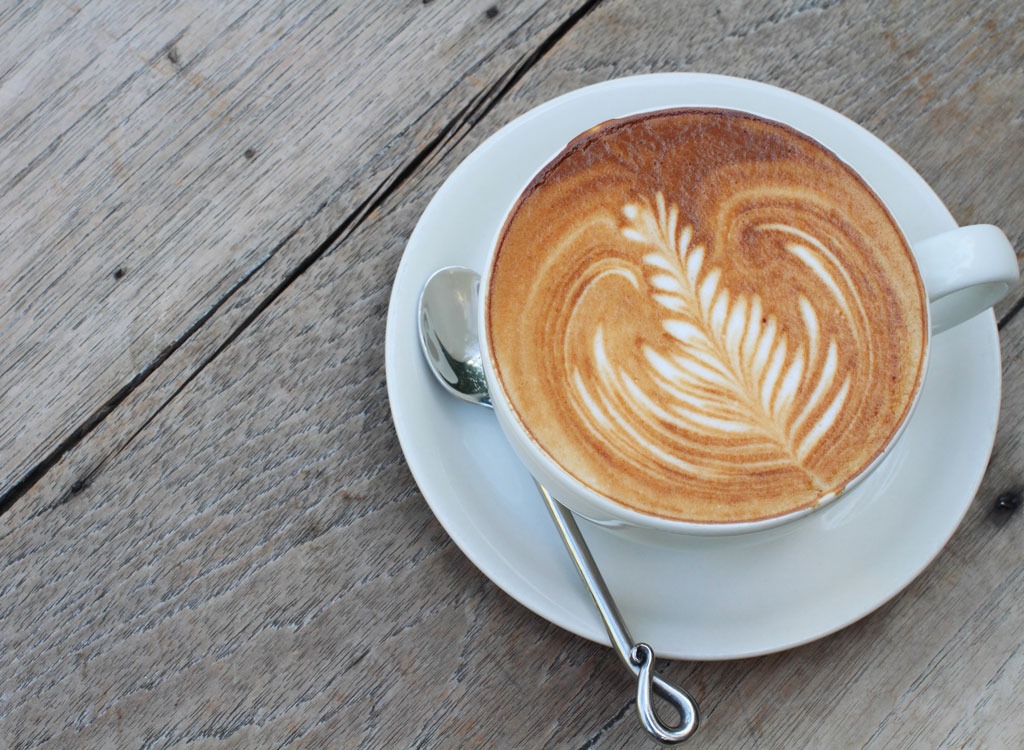
Your vacation was full of stimulants—both from all the activity and all the alcohol—so give your body a break. That means cutting out caffeine, and that means both coffee and tea (and obviously soda as well). If these drinks are part of your daily routine, which we understand is also essential for getting back your slim body, just opt for a caffeine-free product.
Herbal teas, like Rooibos, are great caffeine-free options. Not only is it free of stimulants, this tea from the red bush tea may actually help calm you down. Due to its high concentration of flavonoids—and, in particular, a stress-fighting compound called aspalathin—drinking rooibos may help reduce stress hormones that trigger hunger and fat storage.
Get In Some Guac
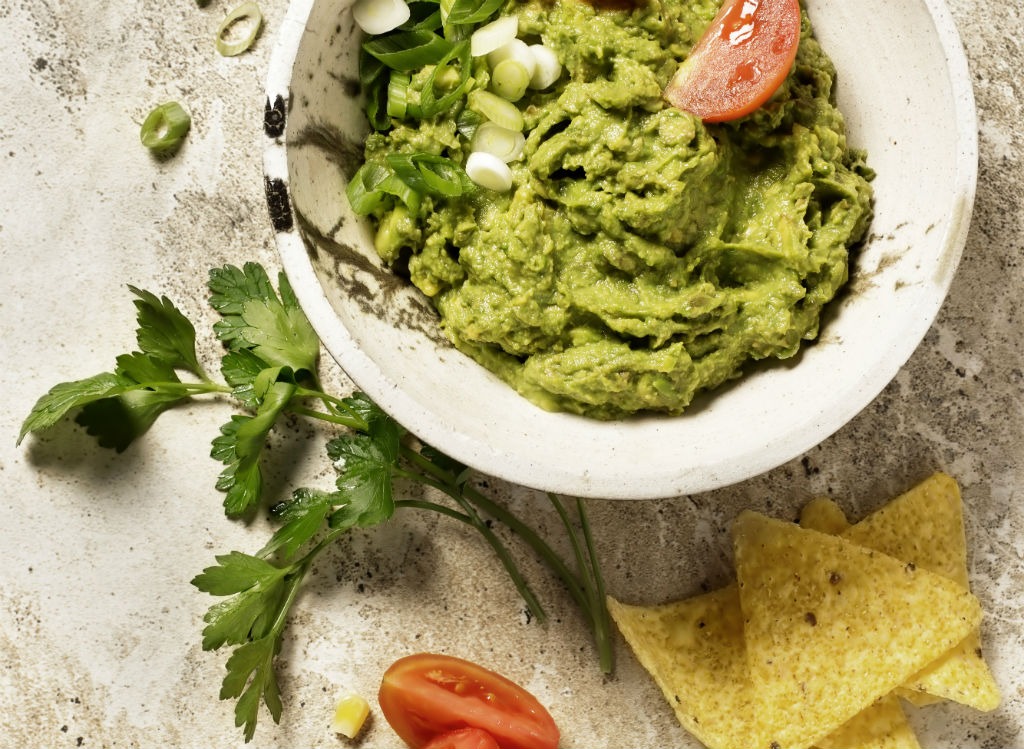
Your liver and kidneys do a pretty good job of detoxing without juices and strange concoctions—so don’t go making these 15 Worst Detox Mistakes, According to Experts. But some foods can help mitigate the adverse effects of a particularly indulgent weekend—especially one that involved drinking—by protecting your detoxifying organs. According to a study in the Journal of Agricultural and Food Chemistry, researchers found that the fatty acids in avocados help minimize liver damage caused by D-galactosamine, a liver toxin. And cilantro, the savory herb that gives guac its distinctive flavor, contains the oils linalool and geranyl acetate which can help relax digestive muscles to calm an upset stomach.
If you’re looking to detox after a booze-filled weekend, many of these best foods to help cure a hangover should be your go-to. They do everything from boosting your immune system and replenishing your electrolytes to stimulating liver enzymes and boosting liver function—all remedies which will benefit your body long after the pounding headache goes away.


